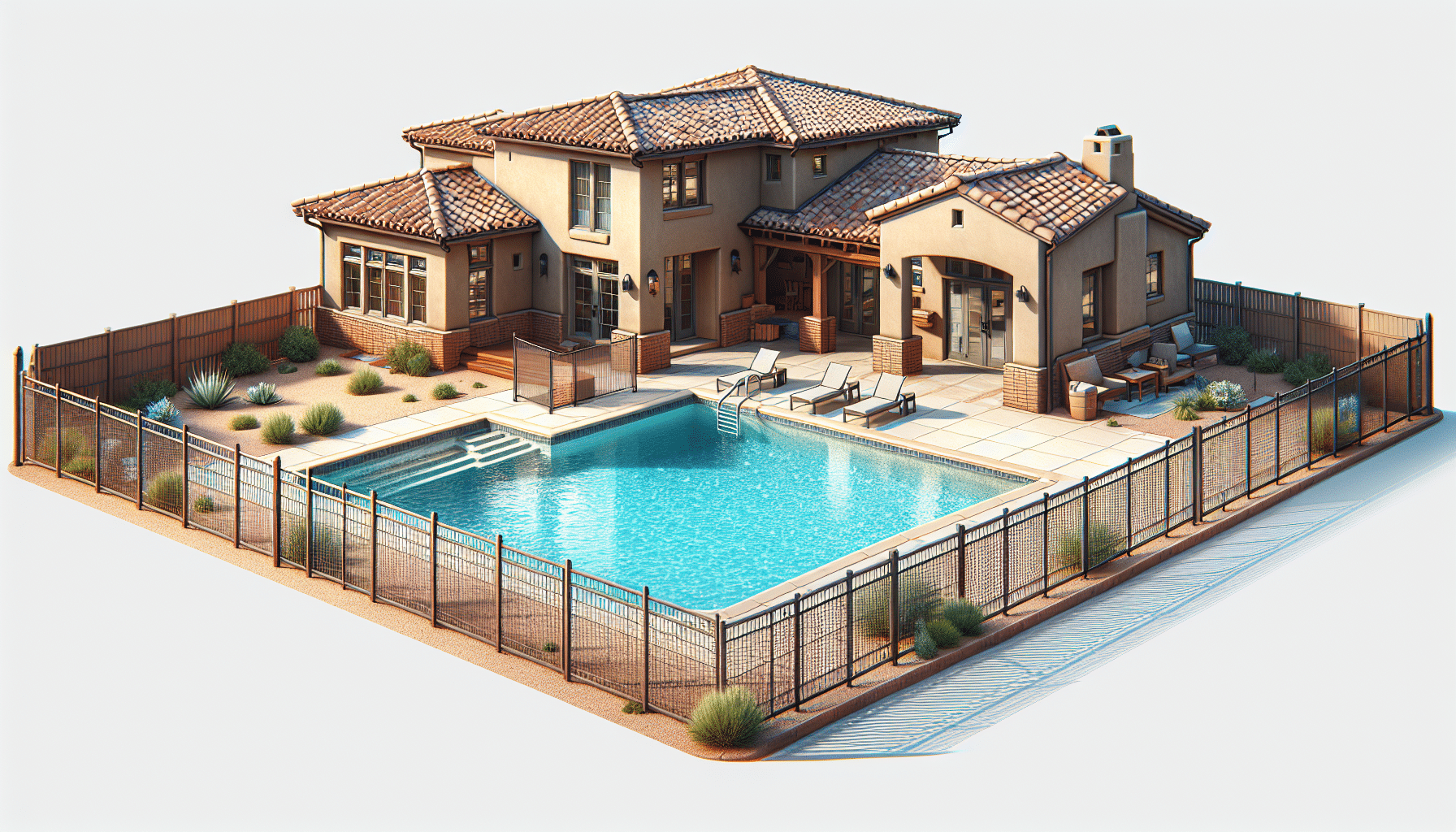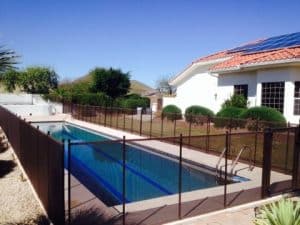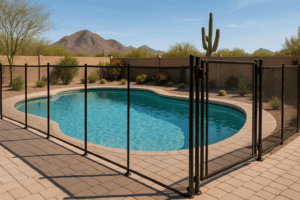Swimming pools are a fantastic addition to any Arizona home, offering a refreshing oasis amid the desert heat. However, they also come with safety responsibilities. As experts at Pool Safety Fencing, we understand the importance of staying informed about the latest pool safety fence regulations and standards. This article is your comprehensive guide to ensuring your pool area is secure for family, friends, and neighbors alike. Let’s dive into everything you need to know about maintaining a safe and compliant swimming pool environment.
Contents
- 1 Understanding Pool Safety Fence Regulations
- 2 Key Features of a Compliant Pool Fence
- 3 The Importance of Self-Closing Gates
- 4 Choosing the Right Material for Your Pool Fence
- 5 Understanding Local Compliance Requirements
- 6 Installation Best Practices
- 7 Maintaining Your Pool Safety Fence
- 8 Updating Your Pool Fence for New Regulations
- 9 Common Misconceptions About Pool Safety Fences
- 10 Our Commitment to Your Pool Safety
Understanding Pool Safety Fence Regulations
Swimming pool safety is not just a best practice; it’s a requirement. Regulations are in place to ensure that pool areas are secure from unauthorized access, especially for children. These regulations vary by state and even by local jurisdiction, but they generally require specific fence heights, self-closing gates, and limited gaps to prevent little ones from squeezing through. Therefore, it’s crucial to familiarize yourself with the specific requirements that govern your area.
Failure to comply with these pool safety regulations can result in hefty fines or, worse, accidents. That’s why we, at Pool Safety Fencing, emphasize understanding the laws that apply to your property. By doing so, you can provide a safe swimming environment while enjoying peace of mind.
Key Features of a Compliant Pool Fence
Compliance isn’t just about adhering to local regulations; it’s about knowing the essential features of a standard pool safety fence. Typically, these fences need to be a minimum of 4 feet in height, though higher is often better. The materials used should be durable enough to withstand the elements and potential wear and tear from usage.
A compliant pool fence should have a gate that closes and latches automatically. This gate should also be situated so that it swings away from the pool area. Additionally, any spaces in the fence should be too small for a child to squeeze through, reducing the risk of unsupervised access to the pool.
The Importance of Self-Closing Gates
One of the most critical features of a pool safety fence is a self-closing, self-latching gate. It’s not just a recommendation; it’s a standard requirement in many areas. These gates are designed to automatically close and secure the entrance, which is vital to maintaining a consistent barrier to the pool area.
Having a reliable self-closing gate reduces the likelihood of someone accidentally leaving a gate open, thereby providing consistent protection. By choosing a high-quality design, you ensure the safety of children and pets with minimal maintenance required.
Choosing the Right Material for Your Pool Fence
When selecting materials for your pool fence, you have several options. Each material has its pros and cons, so it’s important to understand them to choose the one that best suits your needs and complies with pool safety regulations.
Common materials include aluminum, vinyl, and mesh. Aluminum is sturdy and can withstand adverse weather conditions. Vinyl is a more affordable option that still provides durability. Mesh offers versatility and ease of installation. No matter which you choose, ensure it meets all regulatory requirements for preventing pool access.
Understanding Local Compliance Requirements
Regulations can differ widely, even within states, so it’s essential to understand local compliance requirements. Ignorance of the law is no excuse, especially if it leads to a safety hazard. That’s why our team makes it a priority to stay up-to-date on all local rules regarding pool safety fencing.
By being well-informed about these local compliance requirements, you can avoid non-compliance issues that could result in fines or worse. Always double-check your local laws or consult with our experts to make sure your fence is up to code.
Installation Best Practices
Proper installation is just as important as choosing the right materials and features for your pool fence. A poorly installed fence may fail to offer the protection intended, and in some cases, may even lead to compliance issues.
Make sure to hire qualified professionals who understand the nuances of setting up a pool safety fence that meets all standards and regulations. At Pool Safety Fencing, our skilled experts ensure that each installation complies with local codes and offers optimal protection.
Maintaining Your Pool Safety Fence
It’s not enough to install a quality pool safety fence; ongoing maintenance is crucial for sustained safety and compliance. Maintenance helps identify any potential issues, such as rusting gates or wear and tear, before they become safety hazards.
Routine inspections should be performed to check for weaknesses or damages. Cleaning the fence regularly will also help it last longer and function correctly. We advise scheduling professional inspections to catch issues that might not be immediately apparent.
Updating Your Pool Fence for New Regulations
Safety standards and regulations can change, and so should your pool fence if required. Keeping updated on the newest regulations ensures your pool remains a safe area for everyone who uses it. Updating your pool fence when new regulations are released ensures continuous compliance.
Should any new updates come into effect, our team is ready to help you make the necessary changes. We aim to provide solutions that keep your pool fencing compliant with minimal disruption.
Common Misconceptions About Pool Safety Fences
Many homeowners overlook the importance of a safety fence for their pool, thinking other measures might suffice. However, visual barriers like hedges or even a house wall itself do not meet safety regulations. Misconceptions often lead to incomplete or ineffective protective measures.
A misconception is that pool covers can substitute for fences. Yet, covers do not offer day-to-day safety barriers and can still be breached if they’re not used consistently. A proper fence resolves these issues.
Our Commitment to Your Pool Safety
We prioritize your family’s safety. Our pool safety fences are designed not only to comply with regulations but also to enhance the aesthetic appeal of your pool area. With several materials and designs available, we aim to meet all your safety needs without compromising on style.
Ready to secure your pool area? Contact us today at 480-771-8026 or request a free quote. Let’s make your pool safe for all to enjoy.




